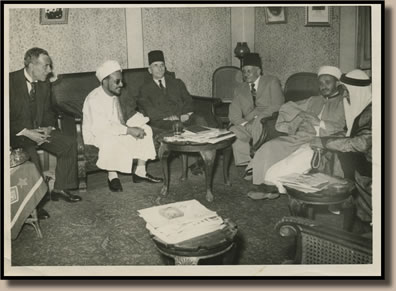“Dar Ashoura” also welcomed Shukri Bey Al-Quwwatli, former and subsequent President of Syria, and even his political opponents. When Syria was struggling for its independence, Al-Quwwatli and his political opponents used to meet at “Dar Ashoura” and discuss everything except their political differences. Even prior to the publication of “Ashoura”, the Tunisian leader Abdelaziz Thaalbi used to come to Eltaher’s shop when he visited Egypt in 1922 and meet with other nationalists from the Levant. A quarter of a century later, “Dar Ashoura” became the meeting place of Habib Bourguiba, the Tunisian nationalist who eventually became his country’s Prime Minister, then President as well as others among his Tunisian companions. They all found at “Dar Ashoura” a place where they could vent their frustrations from the brutality of colonial rule, and contact leaders of other countries and nations.
|
Mohamed Ali Eltaher and visitors at Dar Ashoura in Cairo in 1950.
From right to left: Saudi Ambassador to Egypt Sheikh Abdallah El-Fadl;
Ali El-Moayyad, Minister Plenipotentiary of Yemen in Cairo; General Saleh Harb Pasha, Egyptian Minister of War; Ahmad Hilmi Pasha, Prime Minister of the All-Palestine Government; Emir Sayf El-Islam Abdallah, Minister of Foreign Affairs of Yemen |
Among those who used to visit “Dar Ashoura” were the leaders of Moroccan independence, led by Allal El-Fassi, Emir Abdelkrim El-Khattabi, leader of the Rif region in Northern Morocco, and the senior Algerian Islamic scholar Sheikh Mohamed Bashir El-Ibrahimi. Another visitor was Idriss Senoussi, who became King of Libya after its independence from Italy in 1951, as well as Saleh Masoud Bouyasir, Libya’s Minister of Foreign Affairs under the Republic, who was killed in the shooting down of a civilian Libyan airliner by Israeli fighter planes on February 21, 1973 close to the city of Ismailia in Egypt, under the pretext that it was suspected of being close to Israeli air space.
Eltaher sometimes even acted as guarantor for those who needed references, or simply was an example to follow by others. He also played yet another role beside that of the writer, publisher and nationalist. Parents of children from other Arab and Islamic countries, who elected to send their children to Egyptian schools, often asked Eltaher if he could act as their guardian.
One day a young Indonesian named Abdulqahhar Muzzakkar, was sent by his parents to Egypt to pursue his high school studies. But when World War II flared, he found himself cut-off from his homeland. Eltaher, who acted as his guardian, did not waste time to come to his help. When the young Muzzakkar failed his final Arabic grammar exam, known as the “Ashmouni”, after the name of the author of the grammar book, and the school required him to repeat the school year, Eltaher became so furious that he went to see the Minister of Public Education.
He told the story to the minister, and described the situation of the unfortunate Muzzakkar, who was cut-off from his parents in a foreign land, and for whom Arabic was not after all his mother tongue. Eltaher pointed out to the minister, that if he, i.e. the minister, were to take the infamous “Ashmouni" test, he would fail it! The minister, believed to be Ahmad Ziwar Pasha, chose to be convinced by these arguments, called the School District and ordered that the graduation diploma be awarded to Muzzakkar despite his bad luck with Arabic grammar, which was already quite complicated for the Arabs themselves! Ironically, many years later following this incident, Muzzakkar was appointed Dean of the Islamic University of Jokjakarta in his homeland.
All of these people and many more used to find at “Dar Ashoura” an open door welcoming all to discuss anything of interest to them, but also of interest to Eltaher, because he believed that the cause of all these countries and nations were his too, and that the Palestinian question was part and parcel of all other Arab and Islamic issues.

